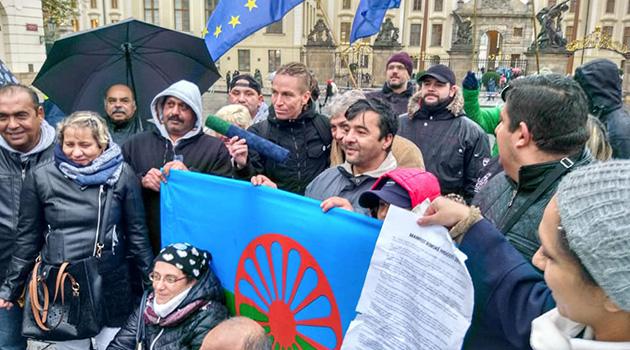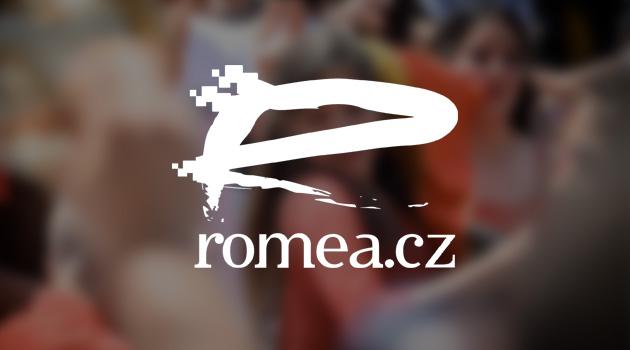News server Romea.cz is publishing below in full translation the “Roma Pride Manifesto” that was read aloud on 28 October 2018 as part of the Roma Pride demonstration in Prague coinciding with the state holiday and celebrations of the 100th anniversary of the founding of an independent Czechoslovakia. A copy of this manifesto was later delivered by the chair of the Pirate Party to the Protocol Department for delivery to the President of the Czech Republic.
Roma Pride Manifesto 2018
We, Romani men and women living in the Czech Republic, are marching today in the Roma Pride March. We are proud of our Romipen, our culture, our families and our children.
Today we are also commemorating the anniversary of the creation of an independent Czechoslovakia. What has the Romani experience of the last 100 years been like in Czechoslovakia?
Can Romani people be proud of this time? What about the state itself?
Can Czechoslovakia and its successor states be proud of the attitude they have taken toward Romani people during the last century? In 1927 the Czechoslovak Parliament adopted what were, from today’s perspective, unconstitutional laws, openly aimed against Romani people, in order to officially make them second-class citizens.
A detailed list of Romani persons was a component of those laws and prepared the basis for the almost-complete genocide of Czech Roma and Sinti during the Second World War. With the significant aid of the bureaucrats and gendarmerie of the Protectorate of Bohemia and Moravia, several thousand Romani people were decimated in concentration camps, and the hundreds who managed to survive in exceptional cases thanks to the assistance and determination of their Czech friends were still traumatized for the rest of their lives.
Romani people were not just victims, though – they actively joined the anti-Nazi resistance. After the war nobody was ever properly convicted of the persecution and annihilation of Romani people in the Protectorate, and the term of “asocials”, one of the terms the Nazis used to refer to Romani people, persisted in usage – today it has been replaced by the apparently less harsh term “inadaptables”, which also has its origin in Nazi rhetoric.
The communist state built an industrial pig farm at the places of this suffering, and those buildings are standing to this day. The Communists wanted to transform Romani people into real “socialist people”, but their often-drastic approach of assimilation was unforgiving in its consequences.
The Communists forcibly broke down Romani family ties, forcibly took Romani children away from their families, and subjected thousands of Romani women to sterilization, which had lifelong repercussions for them. According to the UN Convention on the Prevention and Punishment of the Crime of Genocide, measures aiming to prevent the birth of children in a particular group meet that definition.
We do not have any information about anybody having ever been brought to trial or punished for these crimes. Even after the Velvet Revolution, when the gates to Romani ethno-emancipation were opened, hatred of Romani people was demonstrated just as openly, and several Romani people paid with their lives just for being Romani.
Anti-Romani hatred was one of the main themes of the recent elections here in the Czech Republic – places throughout the country were full of billboards demanding a town without “inadaptables” or “parasites”, promising to segregate Romani residents into a village beyond the city limits, etc. We can hear antigypsyism of the coarsest type from the mouths of the Czech Republic’s top politicians, including the President.
Romani people’s current situation in the Czech Republic is not a good one. Romani people face ethnic discrimination in almost all areas of life, from housing to education.
This discrimination, for the most part, is neither investigated nor prosecuted, even though it contravenes the Czech Constitution and other laws. For Romani people, therefore, the first 100 years of an independent Czechoslovakia have not been an easy time.
For many of us Roma it is very difficult to accept these facts, especially because we consider the Czech Republic our native country. That is also why we have been representing the Czech Republic, more than once, at the highest level in various branches of endeavor, and we are proud of that too.
Is Czech society proud of us Roma? Can we Roma appeal to this society with confidence?
Our wish is that this next century of Czech independence will deliver a change, that Czechs and Roma will find a common language and learn to live together. Our wish is that equal rights will not just exist on paper, but also in reality.
We must fight for our rights – we cannot rely on anybody giving them to us in the spirit of kindness. We are the only people who can change this situation.
We must be heard and seen. We are the ones we have been waiting for.
Long live the Czech Republic!

